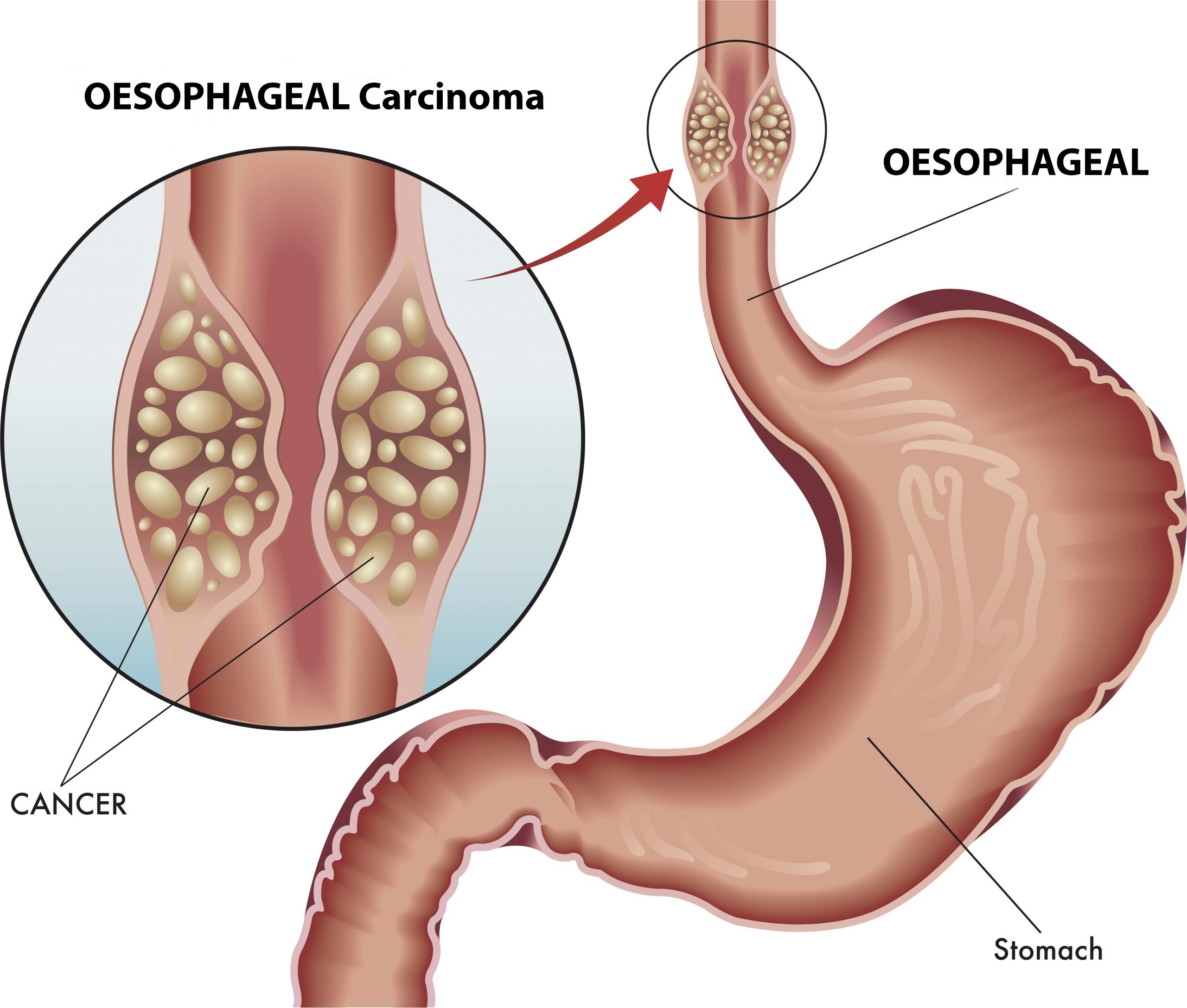Oesophageal Cancer
What is Oesophageal Cancer?
Oesophageal cancer is cancer that occurs in the esophagus — a long, hollow tube that runs from your throat to your stomach.
Oesophageal cancer usually begins in the cells that line the inside of the esophagus. Oesophageal cancer can occur anywhere along the esophagus.
More men than women get Oesophageal cancer. It is the sixth most common cause of cancer deaths worldwide. In some regions, higher rates of Oesophageal cancer cases may be attributed to tobacco and alcohol use or particular nutritional habits and obesity.

Early Oesophageal cancer typically causes no signs or symptoms. As Oesophageal cancer advances, it can cause complications, such as:
- Obstruction of the esophagus. Cancer may make it difficult or impossible for food and liquid to pass through your esophagus.
- Oesophageal cancer can cause bleeding. Though bleeding is usually gradual, it can be sudden and severe at times.
Signs and symptoms of Oesophageal cancer include:
- Difficulty swallowing (dysphagia)
- Weight loss without trying
- Chest pain, pressure or burning
- Worsening indigestion or heartburn
Do consult your doctor if you have difficulty swallowing, vomiting, anemia or unexplained weight loss.
If you have chronic reflux, you should also seek treatment from your doctor, as chronic acid reflux can be a risk factor for Oesophageal cancer if it is not controlled.
If you’ve been diagnosed with Barrett’s esophagus (a precancerous condition which is caused by change in the inner lining of the lower esophagus due to chronic acid reflux), you should discuss with your doctor about surveillance by performing gastroscopy periodically, as Barrett’s esophagus can increase risk of Oesophageal cancer.
Oesophageal cancer is classified according to the type of cells that are involved.
- Adenocarcinoma. Adenocarcinoma occurs most often in the lower portion of the esophagus. It is caused by change in the usual squamous cell lining of the lower esophagus to those of mucus-secreting glands due to chronic acid exposure. This forms Barrett’s esophagus, a precancerous condition.
- Squamous cell carcinoma. The squamous cells are flat, thin cells that line the surface of the esophagus. Squamous cell carcinoma occurs most often in the upper and middle portions of the esophagus. Squamous cell carcinoma is the most prevalent esophageal cancer worldwide.
It’s thought that chronic irritation of your esophagus may contribute to the changes that cause Oesophageal cancer. Factors that cause irritation in the cells of your esophagus and increase your risk of Oesophageal cancer include:
- Having gastroesophageal reflux disease (GERD)
- Smoking
- Having precancerous changes in the cells of the esophagus (Barrett’s esophagus)
- Being obese
- Drinking alcohol
- Having bile reflux
- Having difficulty swallowing because of an esophageal sphincter that won’t relax (achalasia)
- Having a steady habit of drinking very hot liquids
- Not eating enough fruits and vegetables
- Undergoing radiation treatment to the chest or upper abdomen
Diagnosis of Oesophageal cancer requires gastroscopy. The Oesophageal cancer is examined and biopsy is taken. The diagnosis is confirmed with the examination of the biopsy sample under the microscope.
Staging is the process where the doctor determine whether the cancer has spread. The diagnositic tools for staging include endoscopic ultrasound, CT scan and PET scan.
Treatment of Oesophageal cancer includes surgery, radiation therapy, and chemotherapy, depending on the stage of the disease.
Screening for Oesophageal cancer isn’t done routinely except for patients with Barrett’s esophagus.
Prevention is important as Oesophageal cancer is always diagnosed late and has poor prognosis,
- Quit smoking. If you smoke, talk to your doctor about strategies for quitting. Medications and counseling are available to help you quit. If you don’t use tobacco, don’t start.
- Drink alcohol in moderation, if at all. If you choose to drink alcohol, do so in moderation. For healthy adults, that means up to one drink a day for women of all ages and men older than age 65, and up to two drinks a day for men age 65 and younger.
- Eat more fruits and vegetables. Add a variety of colorful fruits and vegetables to your diet.
- Maintain a healthy weight. Obesity is known to be a risk factor for cancer of the esophagus




